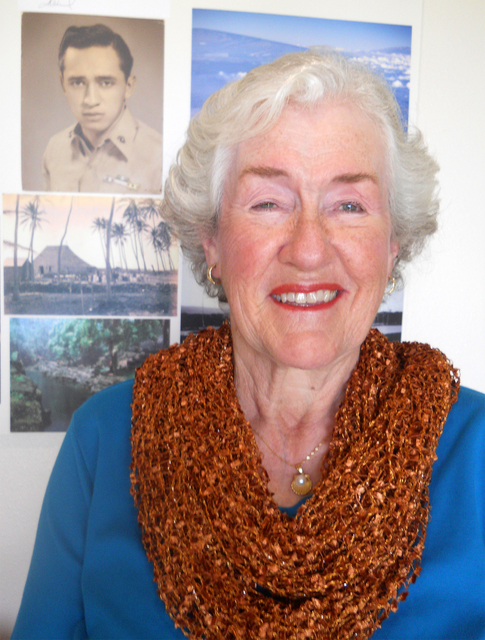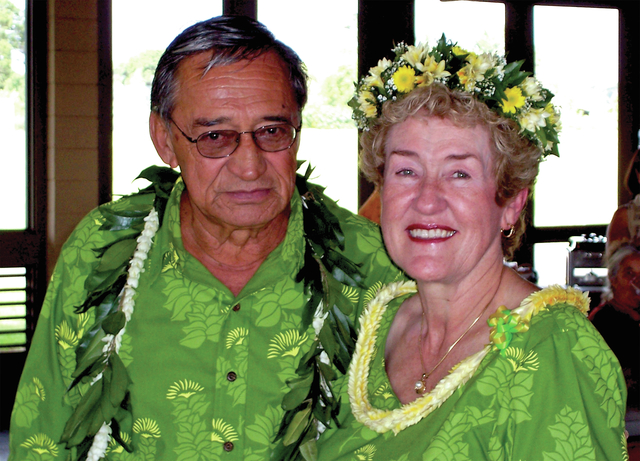WAIMEA — Although Cecilia Johansen, the author of the recently published book, “The Canoe Maker’s Son,” didn’t come to live in Hawaii until 2004, her successive marriages to two Hawaiian cousins from Kapaahu gave her a love for Hawaiian culture and captured her imagination.
WAIMEA — Although Cecilia Johansen, the author of the recently published book, “The Canoe Maker’s Son,” didn’t come to live in Hawaii until 2004, her successive marriages to two Hawaiian cousins from Kapaahu gave her a love for Hawaiian culture and captured her imagination.
Johansen met her first husband, Charles Kanewa, when he came to install her phone on her first day at Hughes Aircraft in Culver City, California.
“I soon discovered he could play ukulele, guitar and sing falsetto,” she said.
Johansen had no intention of writing a book, but during their 21 years of marriage, she wrote down the stories she was told.
“With Charles I sat down and actually took down what he said verbatim as to how he grew up,” she said. “His grandfather, Waiaha Waipa, was a laau lapaau and I have several stories about night marchers. I also would get snippets of things from Charles’ sister Gladys and I just thought that those stories were important.”
Kanewa passed away in 2003 but Johansen continued to attend the annual reunion of Hawaii Marines, which is where, a year later, she met his cousin, Bernard Albert “Al” Johansen. That year she had decided she would dance a hula.
“I requested Hanalei Moon. I was scared spit-less. Here I was dancing in front of this room full of Hawaiians,” Johansen said.
But she needn’t have worried because for one particular Hawaiian man, it was love at first sight. They married in 2004 and settled on a 10-acre Hawaiian Homes ranch in Waimea.
The idea for the book came from Al.
“I asked him, ‘What does your character look like? Where was he born? His main idea was a Hawaiian boy who made canoes and somehow went to the Pacific N.W.,” Cecilia said.
By then his vision had deteriorated to the point that he could no longer read.
“I read to him, sitting on the back lanai looking at the mountain. First we read ‘Kamehameha Warrior Kekuhaupio’ and when we finished that, we went on to ‘Native Planters in Old Hawaii,’” she said.
Johansen’s avid interest in the history of Hawaii inspired her to do extensive research, including a trip to Bishop Museum.
“During the time that Al and I were married and afterwards, I spent years with Roree Ohlman, a genealogist, and Al’s niece, Leona Leialoha, putting together their genealogies,” she said.
When her husband passed away in 2009, the ranch was sold and Johansen moved to a house on White Road. At that point she had about 28 pages, but before going any further, she went to Leialoha to ask permission, which she was given. A few more months of research and writing and the book was finished.
“The Canoe Makerʻs Son” tells the story of a young Hawaiian man who was “shanghaied” on a trading ship to the Pacific Northwest, his years’ long odyssey and eventual return home. The book opens with a family reunion in Waimanalo, and their grandfather – a character based on Al Johansen – telling tales to his grandsons.
The story provides a glimpse into all aspects of life in Hawaii in the late 18th and early 19th centuries, during the height of Kamehameha’s unification efforts and the beginning of Western contact. The main character, Eleu is the son of Kanewa, a Kapaahu canoe maker and fierce warrior. Before being “hanaied” (given) to a family in Kawaihae, he learns his father’s craft. Eleu is then trained in the ancient martial art of lua and becomes a warrior in King Kamehameha’s fight to unify the islands, settling in Waimanalo afterward.
Soon Eleu is sent to Kealakekua to build canoes and is taken when a tall ship sweeps into the bay. Although some Hawaiians volunteered to sail on the tall ships, many were forced into service, which was the practice of the times. The skills and resilience of the Hawaiians who traveled away from home is highlighted through Eleu’s experiences in the Pacific NW, where he manages to survive and becomes a valued tribal member.
This is partly Kanewa’s and Johansen’s story too. They grew up together in Kapaahu but life was difficult and the two families moved to Keaukaha and then Hilo after the beginning of World War II.
“They were both drafted into the National Guard in high school, and Charles went and signed up with the Marines. They had these guys on a ship ready to take them to Korea and they found out that this bunch of Hawaiian boys were under age. They sent them back to Hilo,” Johansen said.
After high school, both cousins joined the Marine Corps and served in Korea. But while Kanewa remained in California, like Eleu, Johansen found his way back home to Hawaii where he shared his Hawaiian stories so they may live on.
Info: “The Canoe Maker’s Son” is available locally at Kona Stories, Lyman Museum in Hilo or online at the Apple iTunes store, Amazon, Google Play, Walmart or Barnes and Noble.


